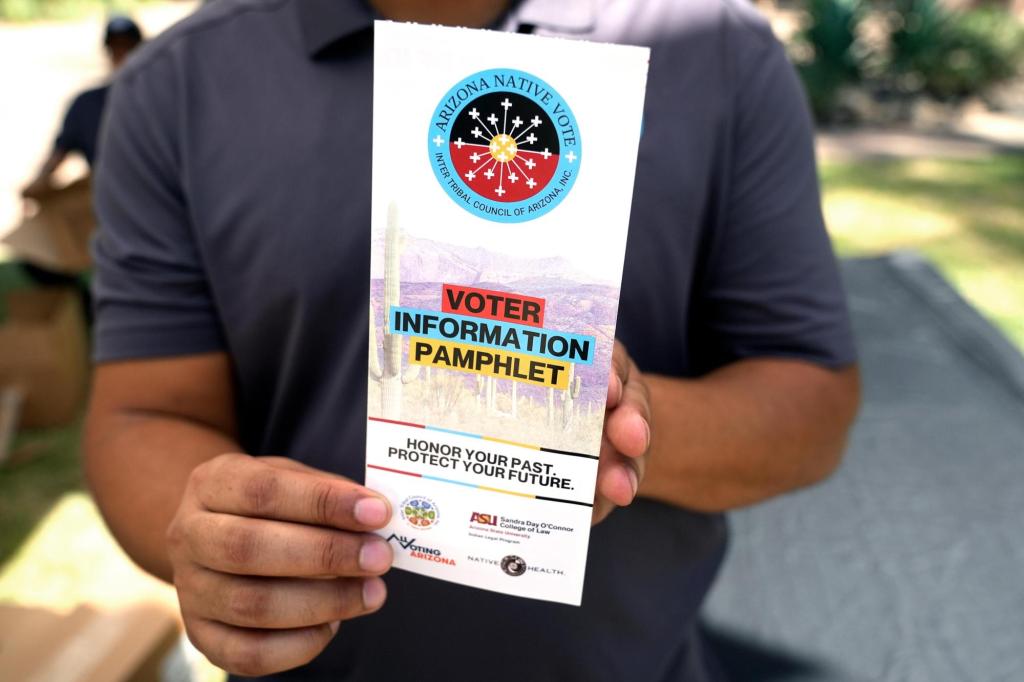By MICHAEL WARREN, GEOFF MULVIHILL and PHILIP MARCELO
Reproductive rights measures are on the ballots in 10 states after heated debates over how to describe their impact on abortion — and that’s just in English.
In 388 places across the U.S. where English isn’t the primary language among communities of voters, the federal Voting Rights Act requires that all elections information be made available in each community’s native language.
Such translations are meant to help non-native English speakers understand what they’re voting for. But vague or technical terms can be challenging, even more so when it comes to Indigenous languages that have only limited written dictionaries.
For example, New York’s referendum doesn’t even use the word “abortion,” complicating efforts to convey intent — advocates complain that the official Korean translation means “drop the fetus.” And how exactly should the science of “viability” in the Florida and Nevada measures be explained in the oral traditions of the Seminole and Shoshone tribes?
The Navajo and Hopi tribes get more material translated than most, and they have more than enough voters to sway outcomes. Under a federal court settlement with the Arizona Secretary of State, county elections officials gather community representatives to reach consensus on written translations. Navajo, Hopi and Spanish interpreters then do outreach and create spoken recordings for the touchpads also used by blind voters.
In most other places, other official English-language material including explanations of the measures’ impacts aren’t getting the same attention, said Allison Neswood, an attorney with the Native American Rights Foundation, which monitors compliance.
“Native language speakers should have access to all the information that English speakers have, including the language that explains the ballot initiatives,” Neswood said.
Other tribes have decided against written translations and instead post tribal translators inside polling stations. The law allows this, despite questions about ballot secrecy and potential bias that even the interpreters say can be problematic.
1 of 4
Alexander Castillo-Nunez, left, a civic engagement coordinator at the Inter Tribal Council of Arizona, Inc., shows a voter t-shirt at an Arizona Native Vote booth during an Indigenous Peoples’ Day event Monday, Oct. 14, 2024, in Phoenix. (AP Photo/Ross D. Franklin)
Expand
For example, Colorado’s Amendment 79 seems relatively straightforward: A “yes” vote would enshrine “a right to abortion” in the state constitution.
But there’s no single word for abortion in the native language of the Ute Mountain Ute tribe in Colorado’s Montezuma County, whose written dictionary has fewer than 10,000 words, so Ute language teacher Helen Munoz will translate in person on Election Day.
One phrase describing abortion in Ute means “your baby, you’re killing it,” Munoz explained. Another points to ending a pregnancy before the embryo develops, as in, “your baby, before it grows, it’s done.”
“I would explain to them that that’s what abortion is — it kills it before it grows into full term,” she said. “I would ask them: ‘What do you think? You’re the one who’s going into that ballot box to mark the one you want. What do you think?’”
Section 203 of the Voting Rights Act requires translations in a county or city where the U.S. Census Bureau has determined that more than 10,000 people are “limited English proficient” voting-age citizens who speak the same language, or that these citizens represent at least 5% of the population and their illiteracy rate exceeds the national illiteracy rate.
Most such places must translate into Spanish. Among states with reproductive rights measures this election, several Arizona counties must provide translations in the languages of the Navajo, Hopi, Apache, Paiute and Pueblo tribes. Other federally required languages include Shoshone and Filipino in counties in Nevada; Seminole in Florida; Ute in Colorado; and Chinese, Korean and Bengali in New York.
Spanish shouldn’t be that difficult, as it is a Latin-derived language like English, but even these can fail when election administrators depend on computer translations. Attorney Cesar Ruiz says his group, LatinoJustice PRLDEF, pushes for human translators instead. “It’s a constant work in progress,” he said.
In Florida, Glades County Elections Supervisor Aletris Farnam said Seminole leaders told her not to bother with written translations — a decision she wants documented so that she’s covered if compliance questions arise.
“I met with the tribe and they told me their language doesn’t convert like that — they don’t have enough words in their language to write the ballot language,” Farnam said. “So what I do is hire a Creek translator to work at the polling station where all the Creek vote.”

















































